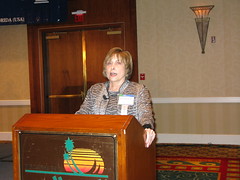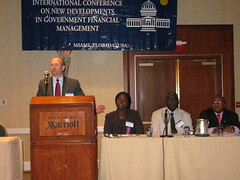
IMG_0695
Originally uploaded by ICGFM
by David Nummy, Grant Thornton
The 2008 International Conference of the International Consortium on Governmental Financial Management (ICGFM) was held in Miami, Florida during the week of May 19, the 22nd occurrence of this annual conference.
A two-part conference, the first three days covered the theme of "Joining Forces for Responsible Leadership to Enhance Good Governance: The People, the Public Officials, the Private Sector and the Press." Attendees of the conference included senior government officials, leadership of the multi-lateral development banks, and members of the private sector with an interest in public financial management. Over 50 countries were represented among the registrants with large delegations from Africa and Latin America.
Notable speakers at the conference included Richard Thornburgh, former U.S. Attorney General, Members of Parliament from Ghana, financial management specialists from the World Bank and the Inter-American Development Bank, the President of an international NGO focused on media around the world, and the Comptroller of Colombia.
The conference incorporated for the first time some cutting edge technology including the use of "voting buttons" that allowed participants to respond to topical questions either on specific presentations or other issues of interest to the audience. These questions were posed throughout each day and proved to be a big hit with those in attendance as it provided instant feedback on the views and background of the crowd. Also new to this conference was the conduct of a real-time blog on the conference which was organized by FreeBalance, one of the conference sponsors. Using a combination of video and postings the blog was linked to other blogs as well as YouTube, Scibd and Slideshare. The ICGFM blog was mentioned on the IMF Public Financial Management Blog. The blog is still active at: http://icgfm.blogspot.com
The last two days of the conference were focused on Auditing and Accountability and had more of a training focus for those who were particularly interested in these subjects. Among the many interesting sessions was one focused on the influence of different cultural and historical backgrounds with representatives from Anglophone, Francophone, and Lucophone Africa. Perhaps the best summary of the discussion and a theme of ICGFM itself came from Mr. Sidi Sosso Diarra, Verificateur General of Mali, who closed his remarks with the statement, "We need to stop focusing on our differences and increase our focus on what we can learn from each other".
Feedback from the conference was overwhelmingly positive and a particularly common comment was how vividly the presentations had illustrated the impact that the four broad groups-citizens and civil society, public servants, the press, and business-have on government reform.























